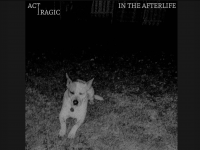
Having formed back in the late Eighties off the back of the California thrash metal scene, Primus have returned with their ninth studio album, The Desaturating Seven. How will the album, a story of goblins as much as music hold our attention?
Whilst nine studio albums since 1990 may not seem like a huge amount, the band’s touring history is no joke. Having gone through several drop-ins and drop-outs of line-up changes, the band have weathered many a storm. With frontman Les Claypool taking influence from children’s book, The Rainbow Goblins, we take a seat and listen to the…ahem, story.
With so many years of experience, the first thing that leaps out about “The Valley”, and the album as a whole, is the production itself. The track, and voiceover within, warp and twist across the channels in an uneasy and disturbed fashion, as the narration tells the story of the goblins who drink colour (have a look at the album cover, it makes sense).
Scary story-time aside for now, the strange violin and strangled vocals build upon this feeling whilst a pacy and unnerving bass ensure that there is no let up for the listener, as we are told the story of The Desaturating Seven.
Once we are aware of “The Valley” in the story, Primus rattle back into more familiar territory (well, for them at least) with their countrified blend of sparkling telecaster guitar, organ notes tucked away in the back and a deranged blues bass and drum line as we progress through the story of “The Seven”.
As the journey of our eponymous goblins begins in earnest with “The Trek”, the band slowly begin to extricate themselves from the entry tracks with a more traditional set of instrumentals and FX, with some impressive slapped bass and sliding guitars, filled with some subtly intricate drums. Whilst the lyrical matter might still be enough to terrify a child, (the story, whimsical as it might be, is NOT suitable for your kid’s bedtime) the vocals themselves show the heavily accented range of Les Claypool as he retells the story of the goblins in their quest to devour a rainbow.
If there was ever a track that would cement the fact you’ve heard Primus before, even unknowingly, it would be the short and sweet, “The Scheme”. Amidst the towering bassline that dominates the track as it thunders away in the backline, only interspersed with some guitar fills loaded with overdrive and gratuitous use of the whammy bar, is Claypool’s most familiar vocal set. The one that used in his recording of the original South Park theme tune.

As this weird and wonderful album, that would likely be classified as a concept album had it come from any other source, comes towards its end, we are met with two of the larger tracks of the album, “The Dream” and “The Storm”.
Perhaps strangely, Primus are massively influential, and to one of the widest spheres of musicians you could envisage. Artists from Korn, Muse, Deftones and even Limp Bizkit state them as influences. But to be completely honest, even just listening to the two aforementioned tracks, it’s easy to see why.
Strangeness aside, or even included in fairness, the three-piece set are clearly masters of their craft. To be able to sound this chaotic, but not repel listeners shows the mastery of their respective instruments. It’s akin to watching Steve Vai in Crossroads (search Eugene’s Trick Bag if you don’t know the movie); the legendary guitarist has to fail a solo, something that, to look as realistic as it does, you must be able to also play perfectly.

With this is mind, these two longer tracks show this fact of Primus, the dreamscape of instruments is carved out of the influence of the children’s story book this album has spawned from in “The Dream”, as subtle reverb and a pulsing bass with a slower and intricate drum line lilt across the running time. This gives way to a building sense of tension in “The Storm”, which grows into a solo to lead into the final track, “The Ends?”
Strange? Yes. Talented? Definitely. Whatever your take on the entirely gapless album, Primus succeed in taking the listener on a multi-faceted journey spun from naught but a children’s story book. Whilst it might not satisfy everyone on the grounds of an ‘album’ what else would you expect from a band that literally comes with their own genre tag in many a music library.

Author: Steve, Southgate Store





